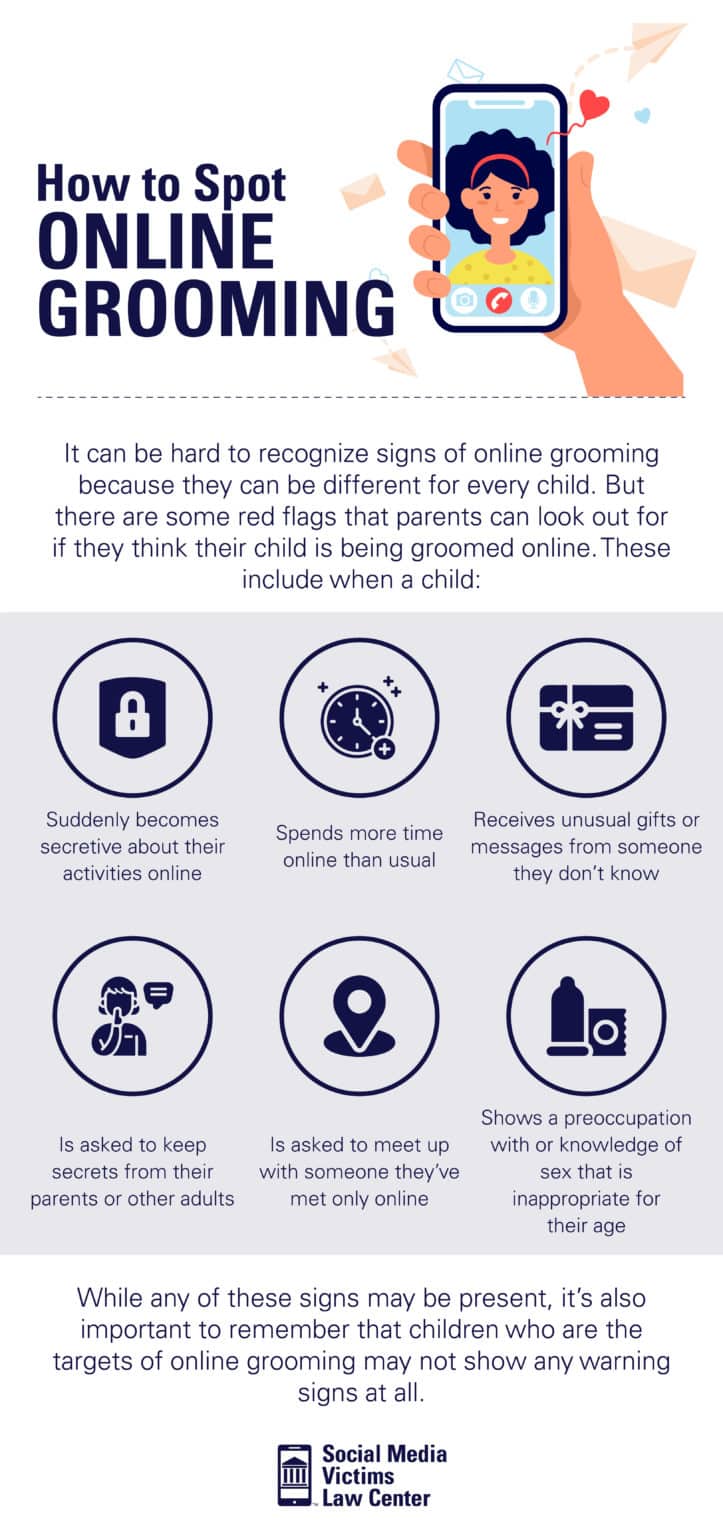Social Media and Online Grooming
Young people today spend much of their lives online. It’s where they interact with peers, learn about the world and pursue hobbies with others who share their interests. However, it can also be a dangerous place.
 Written and edited by our team of expert legal content writers and reviewed and approved by Attorney Matthew Bergman
Written and edited by our team of expert legal content writers and reviewed and approved by Attorney Matthew Bergman
- Content last updated on:
- October 2, 2025
Written and edited by our team of expert legal content writers and reviewed and approved by

- Content last updated on:
- October 2, 2025
What You’ll Learn
As enriching as the online world can be for children, it can also be quite hazardous. The same openness that allows children to connect in healthy ways on the internet can also make them vulnerable to predators, who often use social media, chat rooms, and gaming platforms to reach out to young people and build relationships with them.
What is online grooming?
Online grooming occurs when an adult establishes an emotional connection with a child through online communication with the intent of gaining their trust and ultimately exploiting them.
Online grooming is an attempt to lower a child’s defenses gradually. It involves a predator interacting with a child in ways that seem innocent at first but progressively become inappropriately intimate or familiar. Predators may start, for example, by complimenting the child or discussing shared interests in an attempt to gain their friendship.
Grooming can take many forms, but it often involves predators using a child’s fear against them. After establishing a friendly interaction, the predator may introduce sexual topics, or send explicit images or videos to the child. This may establish a kind of “special relationship” or shared secret.
A predator may then use the threat of exposure to try to convince the victim to engage in other inappropriate behaviors. This is often an attempt to draw the victim into further compromising scenarios that can be used as blackmail to deepen the relationship.
Predators may threaten to tell a parent or other authority figure about the interactions if the victim does not meet their demands. Those demands can include requests for inappropriate pictures or videos of the victim or a request for an in-person meeting. This kind of interaction can quickly progress to the point where a child or teen is at risk of sexual assault, sexual abuse, or even human trafficking.
Online grooming can be very dangerous, and parents need to talk to their kids about staying safe online.

Who is at risk of online grooming?
Because online grooming takes place on social networking sites, chat rooms, gaming sites, and online forums, anyone who uses such sites can be at risk. That includes popular sites such as Snapchat, Instagram, TikTok, or any other place people interact online. Today, with the ubiquitous popularity of social media, the profile of potential victims includes almost all children and teens.
How do you know if it’s happening?
It can be hard to recognize signs of online grooming because they can be different for every child. But there are some red flags that parents can look out for if they think their child is being groomed online. These include:
- A child suddenly becoming secretive about their activities online
- A child spending more time online than usual
- A child receiving unusual gifts or messages from someone they don’t know
- A child being asked to keep secrets from their parents or other adults
- A child being asked to meet up with someone they’ve met only online
Children who show sudden withdrawal from hobbies, or from socializing with people their own age, may be displaying warning signs of online grooming. Children who show a preoccupation with or knowledge of sex that is inappropriate for their age may also be showing signs of grooming.
While any of these signs may be present, it’s also important to remember that children who are the targets of online grooming may not show any warning signs at all.

How can you protect your child or teen?
It can be frightening to think about the dangers that lurk online for your children and teens, particularly because all children accessing social media sites and other online networking channels are at risk of online grooming.
Some parents and guardians may not know how to deal with these dangers or they may be overwhelmed by the risks that seemingly lurk in every corner of the internet. But parents and guardians can take some steps to protect their children and help them protect themselves.
Be Honest About Online Dangers
First, let your child know about the dangers of online grooming. Predators rely on the fact that children may be unprepared and naive about their tactics. Make sure your children understand that an older person who approaches them online may have ill intent.
Be honest with your child about why they shouldn’t share personal information or agree to meet anyone they don’t know in person. If you discuss these issues with your child openly, they will be more likely to heed your advice
Stay Informed About Your Child’s Activities Online
Parents and guardians can set ground rules for their children online, and technology can help them enforce those rules.
Be clear with your child about what websites they can visit and what apps they can use — and which ones are off-limits. Consider installing parental control software on their devices to help reduce their exposure to harmful content.
Google Alerts using your child’s name can help you keep track of “tags” to photos or comments concerning your child. You can also use helpful tools like monitoring apps for iPhones and Androids to track your child’s call logs, text messages, and who they have access to — or who has access to them — online.
Talk to Your Children Openly
If you’re concerned about your child being groomed online, it’s crucial to speak to them. Try to encourage them to be open and honest with you about their activities and who they’re talking to online. Make sure they understand the stakes: online grooming can be dangerous and may put them at risk of sexual assault or other forms of sexual violence.
Don’t be afraid to ask your child about their activities online, and don’t assume that they will try to hide if they’ve been targeted by a groomer. Online predators often try to appear unthreatening, and your child may readily volunteer information that seems innocent to them but that you will recognize as a red flag.
It’s imperative to be extra vigilant about who your child is talking to online, particularly people outside of their school or local community. If they spend a lot of time chatting with someone you don’t know, or if the conversations seem strange or inappropriate, speak to them about it, and try to get more information.
Be aware if your child reports chatting online with someone who shows an unusual interest in their personal life or asks for details regarding their school, hobbies, or family.
You may need to seek the advice of a psychologist or other expert if your child isn’t open to communicating with you truthfully, begins to show signs of depression or withdrawal, or exhibits suicidal behaviors.
If you believe that your child is being groomed online, or if you have any other concerns about their safety, please get in touch with the police immediately.
Reporting Online Grooming After it Has Happened
If you or someone you know is a victim of online grooming, it’s essential to report the activity as soon as possible. Law enforcement agencies have special units that deal with internet crimes, and they can help you protect your family and get the justice you deserve.
When reporting online grooming, be prepared to provide as much information as possible about the incident, including the date, time, location or website where it occurred, the name of the perpetrator, and any other identifying information.
You may also be asked to provide screenshots, chat logs, emails, or other evidence of the crime. It’s important to take these screenshots as soon as you know something is going on in case the predator is later able to delete the conversation.

Why is it important to report suspected or confirmed online grooming?
Reporting online grooming can help prevent future incidents to other children and hold the perpetrator accountable for their actions. It’s also essential to get support for your child if they’ve been affected by online grooming.
The whole process can feel challenging, but it’s important to remember that you’re not alone. There are people and resources available to help and support you and your child through what can be a very tough time.
If your child has been the victim of online grooming, it’s essential to report it to the police as soon as possible. This will help them investigate the crime and punish the perpetrator, keeping your child and other children safe from ongoing or future harm.
Reporting online grooming can be daunting, but some organizations can support you through the process. They can also give you some much-needed advice on what to do next.
You can report online child sexual exploitation via the electronic Cyber Tip Line or call 1-800-843-5678. This line is operated by the National Center for Missing and Exploited Children, an organization having partnerships with the FBI and other national and local law enforcement agencies.
If you have any other questions or concerns about your child’s social media experiences, their online risks, and dangers to their mental health, safety, or overall well-being from using online networking sites, contact the Social Media Victims Law Center for more information about how we can help.
Frequently Asked Questions
For individuals and children who have been
We only handle cases on a contingent fee basis. This means that we are paid a portion of any recovery obtained in the case and you do not owe us any attorneys’ fees if the lawsuit does not result in a recovery.
Every case is unique. Our attorneys will work with your family to evaluate your potential case and help you evaluate whether filing a lawsuit or other legal proceeding is in your family’s best interest. Generally speaking, the types of cases we handle involve serious mental health effects, including attempted or completed suicide, eating disorders, inpatient mental health treatment, or sexual trafficking/exploitation that was caused by or contributed to through addictive or problematic social media use by teens and young adults.
We are a law firm based near Seattle, WA comprised of lawyers who have spent their entire careers representing victims who have been harmed by dangerous products. We are also parents. Shocked and troubled by the recent revelations about the harm caused to teens and young adults by social media platforms, which powerful technology companies have designed to be highly addictive, Social Media Victims Law Center was launched specifically to help families and children who have suffered serious mental harm or exploitation through social media use to obtain justice.
Contact Us Today
Related Pages
Client Testimonials
Explore Popular Topics

Addiction

Suicide

Eating Disorders

Anxiety

Bullying

Sexual Abuse

Body Image

